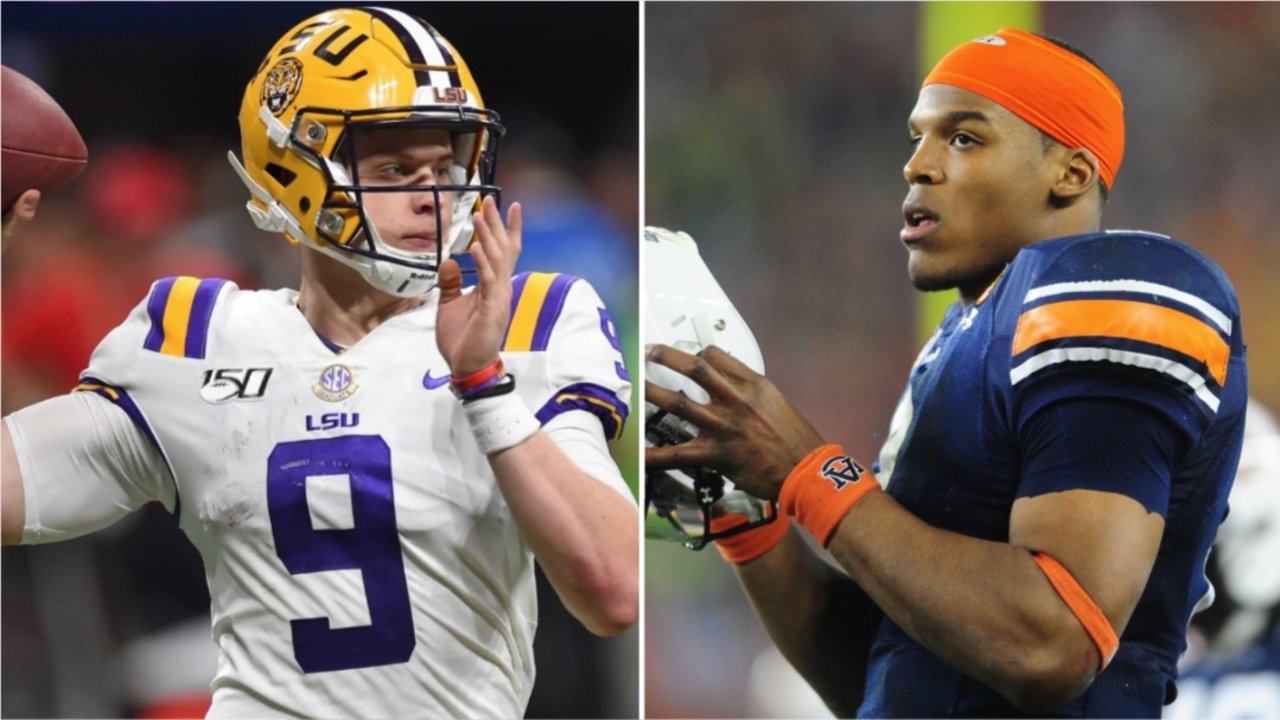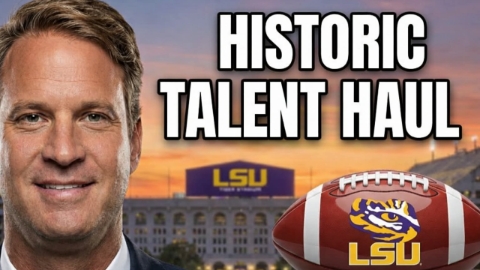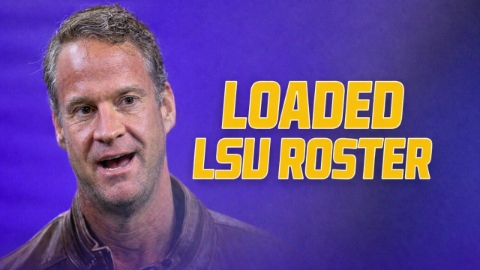
With one week remaining before the season kicks off for most college teams, Auburn has found a way to dominate national headlines from the plains.
You probably noticed Auburn controversially claiming an additional four national titles retroactively, including the 1958 title LSU currently claims, but that’s a topic for another column.
On Monday, Auburn announced it will retire Cam Newton’s No. 2 jersey on Oct. 11.
There’s no doubt in my mind that Newton is deserving of every honor Auburn feels it can offer.
Of course with this news we’ve seen the reemergence of this narrative:
“Cam Newton had the most dominant season in college football history.”
The problem is, this narrative expired on January 13, 2020, and it’s time to set the record straight – Joe Burrow had the most dominant season in college football history.
To be clear, this is no disrespect to Newton. Newton is the second-best college football player I’ve ever seen.
Cam Newton was Superman in 2010 - the complete package. Against LSU he broke off a 50-yard run where he broke tackles from two of the greatest defenders in LSU history—Patrick Peterson and Tyrann Mathieu. After that, those two would go on to win the next two Bednarik Awards for the best defender in college football.
Newton also had a cannon, passing for 2,854 yards, 30 TDs and 7 INTs with another 1,473 yards and 20 TDs on the ground. That’s good enough to be an All-SEC quarterback AND running back most seasons.
Newton did all this on his way to leading Auburn to an undefeated season and national championship. It was the most impressive thing I had ever seen a college athlete do at the time.
Enter Joe Burrow and the 2019 LSU Tigers.
Burrow holds the record for the most total yards (6,039) and touchdowns (65) in a single season in FBS history. College football has been played for 155 years and he has the only 6,000-yard season in college football history. LSU scored the most points in FBS history. He won the Heisman trophy by the largest margin in the history of the award.
And he did all this while beating seven top-10 teams - also the most in FBS history - including five of the final top-8 teams by an average score of 19.6 points per game. LSU played the No. 1, 3, 7 and 13 scoring defenses in 2019 and averaged 42 points per game.
In fact, during the entire season - despite playing more top-10 teams than any team in FBS history - not one team had the ball with a chance to take the lead in the fourth quarter. It was utter dominance against one of the toughest schedules ever played.
Guys, what are we talking about? No one has come close to accomplishing what Joe Burrow did - especially once you layer in how difficult that slate he faced was.
Now I can already hear the rioters yelling at me from Toomer’s Corner as if I were Harvey Updyke in the flesh: “BUT CAM HAD NO TALENT AROUND HIM AND BURROW HAD AN NFL ROSTER.”
I hear you. Let’s address that.
Yes, Burrow got to throw to Justin Jefferson and Ja’Marr Chase and a plethora of other elite players. And yes, Newton was the only player from that 2010 Auburn offense to make a significant impact in the NFL.
There are three different angles I’ll tackle this argument.
1. The ability to elevate a bad team to good isn’t necessarily better than elevating a good team to an all-time great.
Let’s begin with a hypothetical.
Let’s say you have an NFL team that is doomed to go 0-16 with an atrocious 52-man roster. You get to sign one player to try and win as many games as possible - who helps more in their prime? Cam Newton or Tom Brady?
The answer for most fans should be Cam Newton. Not because he’s a better player than Brady, but because he has a more diverse skill set. He’s a one-man army. He can run the ball, break sacks, buy time with his legs, and has a good enough arm to hit the few open receivers he’ll have.
Brady’s ability to read the field and make accurate throws downfield would do him little good if his receivers aren’t open and his line isn’t blocking. A quarterback like Brady relies on help from teammates.
Yet the notion that Cam Newton is a better quarterback than guys like Brady, or Peyton Manning, or Aaron Rodgers would be a silly one, to say the least.
That’s because what truly makes an all-time great quarterback is their ability to use great teammates. Randy Moss can be open downfield all day, however, he still needs a 50-yard dart to hit him in stride in order to make a play.
Newton took an Auburn team that was likely going 8-4 or worse and elevated them to national champions. Burrow took a team that was going to win nine or ten games without him and made it the greatest football team in college football history (sorry, 2001 Miami, I’ll dissect your claim another day).
So while others argue Newton did it without the playmakers Burrow had, I’ll argue Newton wasn’t a polished enough passer to use the receivers the way Joe Burrow did.
And that brings me to my second point.
2. The results weren’t close enough for the supporting cast to matter.
Citing the surrounding talent is a great argument to determine quality between two players with similar results. It’s a good tiebreaker so to speak.
And on the surface, I get it. Joe Burrow and Cam Newton both went undefeated in the SEC, won the national championship, won the Heisman Trophy, and got drafted first overall.
But to say these accomplishments were done in equal fashion would be like saying a sailboat and a private jet are the same because they both took you around the globe.
Newton passed for 2,854 yards, 30 TDs and 7 INTs. Burrow actually doubled that total. I don’t mean that as a metaphor - no, he actually passed for 5,671 yards and 60 touchdowns.
Of course, Newton was a freight train of a runner, but even after adding in rushing stats, it’s still not particularly close. Newton had 4,369 total yards and 51 total touchdowns. That’s about 72% of Burrow’s 6,055 total yards and 78% of Burrow’s 65 total touchdowns.
Burrow was nearly flawless in every game he played. Go ahead, look through the games. Tell me which game was the “bad game.” As I wrote in a column during the 2019 season, Burrow’s Heisman moment was every moment he took the field.
There were plenty of instances in 2010 where Cam Newton needed his defense to step up to win a big game.
Auburn scraped by Mississippi State 17-14 in a game where Newton accounted for 136 yards passing and 70 rushing yards. Auburn beat Clemson 27-24 in overtime in a game where Newton completed 50 percent of his passes for 203 yards with a pair of touchdowns and a pair of interceptions.
He ran all over LSU with more than 217 yards and two touchdowns, but passed for just 86 yards and put up only 24 points in that game. Auburn needed running back Onterio McCalebb to rip off a 70-yard run with five minutes to play to secure this win.
In the national championship against Oregon, Auburn scored just 22 points. Auburn defensive tackle Nick Fairley showed out with a dominant performance, limiting the electric Oregon offense to just 19 points.
And, let’s not forget Auburn freshman running back Michael Dyer hit two huge runs of 37 and 16 yards on the game-winning drive to set up the walk-off field goal.
Newton played fine in that game, completing 59% of his passes for 265 yards, two touchdowns and an interception. He also added 64 yards on the ground on 22 carries for 2.9 yards per carry. But he hardly carried his team to victory single-handedly as the online rhetoric would have you believe.
Meanwhile, Burrow and LSU were simply outgunning everyone they played and running the clock out on final drives. Burrow and LSU played all of college football’s finest defenses, and they were helpless to slow down the offensive juggernaut.
Remember those seven games against top-10 teams LSU beat that I mentioned? LSU scored 43 points per game in those games. In 2010, Auburn played two such games and scored 24 and 22 points in those games.
Let me reiterate one last time - what Burrow did and Newton did are not the same, and it’s not close.
Talk to me about the talent around them after we acknowledge that. In fact, that’s just what we’ll do with my final point.
3. Newton’s 2010 supporting cast is overhated.
Yes - Cam Newton was the only player from that offense to make an impact in the NFL.
But just because a player didn’t pan out in the NFL doesn’t mean they were awful college players. You can even point to extreme examples like Tim Tebow, who had one of the most decorated college careers ever, but couldn’t cut it in the NFL.
But NFL futures shouldn’t take away from what players accomplished in 2010.
Was Michael Dyer not a five-star recruit who ran for 1,093 yards as a freshman that year because he didn’t do well in the NFL? Did his game-winning runs against Oregon not matter?
Did Onterio McCalebb’s 8.5 yards per carry and nine touchdowns not happen because he failed to record a stat in the NFL? Did that 70-yard run to break the back of LSU with five minutes remaining not help out in a game where Auburn couldn’t pass the football?
I’m not going to sit here and tell you how incredible the receivers were, but it’s not like Newton was anywhere close to Burrow’s passing numbers.
And what about that defense? Was Cam Newton out there playing linebacker when it held Mississippi State to 14? That defense doesn’t get nearly enough credit for limiting Oregon to 19 points, LSU to 17 points, Clemson to 24 points in overtime, and Alabama to 27 after giving up 24 in the first half.
Cam Newton certainly didn’t have nearly as strong of a supporting cast as Joe Burrow, but he absolutely had some good help.
At the end of the day, Cam Newton’s 2010 season was incredible. He carried an Auburn team on his back, made highlight-reel plays, and won a national championship. But when you put his numbers, schedule difficulty, and accomplishments side by side with Joe Burrow and the 2019 LSU Tigers, there’s no debate. Burrow dominated in a way that no one else has, setting records that may never be broken while facing the toughest schedule any team has seen.
Newton will always be a legend, but Burrow’s 2019 season is on another level.

